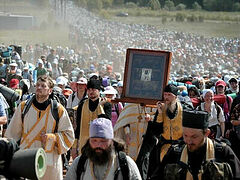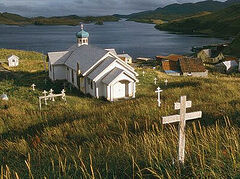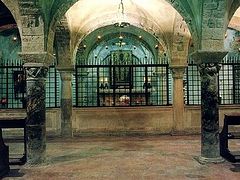 Artist: Igor Rodionov In December, we have a special day—the feast of St. Nicholas the Wonderworker. And our joy is even greater because this feast is the name day of the holy Tsar-Martyr Nicholas Alexandrovich. We all know how many miracles were performed through the intercessions of the holy Tsar-Martyr before his canonization. Evidence of these miracles comprise two volumes of almost 1000 pages, where they were collected. And perhaps not so many testimonies have been collected about St. Nicholas of Myra, but if people would take care to do it, then, I think, even the world itself could not contain the books that should be written (Jn. 21:25). And miracles through the intercessions of St. Nicholas continue to occur. Recently we received a letter from the Orel [also spelled Oryol] Diocese, which testifies to one of these miracles. Let me cite this testimony:
Artist: Igor Rodionov In December, we have a special day—the feast of St. Nicholas the Wonderworker. And our joy is even greater because this feast is the name day of the holy Tsar-Martyr Nicholas Alexandrovich. We all know how many miracles were performed through the intercessions of the holy Tsar-Martyr before his canonization. Evidence of these miracles comprise two volumes of almost 1000 pages, where they were collected. And perhaps not so many testimonies have been collected about St. Nicholas of Myra, but if people would take care to do it, then, I think, even the world itself could not contain the books that should be written (Jn. 21:25). And miracles through the intercessions of St. Nicholas continue to occur. Recently we received a letter from the Orel [also spelled Oryol] Diocese, which testifies to one of these miracles. Let me cite this testimony:
“My grandmother’s name was Maria Semyonovna Kryukova, nee Nedorodova. She was descended from a count’s family. And my grandfather Vasily Fyodorovich came from a merchant family in Orel. His father was a churchwarden in Domnino. Somewhere in this area they had a large family estate, which was later sold. When the family became large, they bought a house in Mtsensk, so they were well known in this town. Once my grandmother came down with rectal cancer. The doctors refused to treat her, saying that it was incurable. And she was still young and had children. She prayed. And one night she had a dream, in which she was hanging out laundry in the attic of her house. She turned and saw St. Nicholas standing and saying to her: ‘Sew me a shirt.’ With that, she woke up. They were rich, but her husband managed to find all the money. Without saying anything to anyone, she pawned all her gold and jewelry and arranged for the nuns of the Convent of the Entry of the Theotokos into the Temple who sewed with gold to make bishop’s vestments of gold for St. Nicholas’ service. And when they sewed it, she took her eldest daughter; they tied headscarves on themselves very low like nuns and walked from Orel to Mtsensk to St. Nicholas’ miracle-working icon at the cathedral. They carried the vestments in a large box and arrived by the evening. When the Vespers began, they called an acolyte and said: ‘Take it, please. A woman asked me to give it to Nicholas the Wonderworker. Put it on him.’ And she did not say that it was from herself. And my grandmother recovered, although her cancer had been incurable. She greatly venerated St. Nicholas.
“And her death was remarkable. In 1919, it snowed unusually copiously on the May feast of St. Nicholas. She was old and sick. Her children and grandchildren did not let her go to the Vigil. There were snowdrifts, but in the morning everything melted. But she insisted: ‘No, I’ll go to Nicholas the God-Pleaser.’ And when she came back, she got so weak that she never got up again. Before her death, a priest from Nikita came and gave her Communion. Everyone gathered at her deathbed. At night, a fire was reflected on the tiled stove, and she was lying so cheerful and looked pink. ‘Oh, children, who’s come to me!’ And we asked: ‘Grandma, tell us who’s come! What can you see? Tell us.’—’No, I can’t tell you.’ All of us knelt and cried: ‘Tell us, grandma!’ And she revealed: ‘Nicholas the God-Pleaser.’ ‘And what does he say, grandma? Tell us!’ ‘No, darlings, I can’t tell you. He said three words.’ And she died with shining eyes in great joy.”
Such evidence is truly, as we sing in the akathist to St. Nicholas, “an inexhaustible sea of miracles.” St. Nicholas is a great saint. And at the same time, we all know that he is so simple and approachable. Believers address him as their kin: “Nikolushka,1 help!” No wonder he helps out when there is a housing issue, a trial, some kind of danger, or a scandal. Ask Nicholas the Wonderworker. Don’t be afraid, ask him, and he will hear you. That’s why Russian people have always said, “When you have a hard time, tell Nicholas the Merciful, and he will tell the All-Merciful Savior.” And when we receive what we asked for, we feel that this is from the saint who loves to please people, that he gave gifts in his lifetime and for him it is even greater joy to give now and see people’s joy. After all, the most important thing in a gift is to see the joy of a person who receives it. How joyfully the eyes shine and the face lights up! For St. Nicholas, people are like children to whom he brings gifts. A gift is hope. This saint is a giver. He is present on the eve of the New Year, in winter and in spring, filling everything with the festive spirit and radiance. With him the snow feels warmer and flowers brighter. In winter he anticipates the Nativity of Christ, and at the Vigil of his feast, at the great entrance, the Christmas stichera resounds:
“Adorn yourself O cave! Shepherds playing the flutes, testify of the awesome miracle. And the wise men from Persia, bring gold, incense and myrrh to the King.”
The Church announces on this feast the coming of the Savior into come the world. And in the spring, the fullness of spring and the Lord’s Pascha come with the feast of St. Nicholas.
Let us reflect on why St. Nicholas is so merciful, generous and so willing to help people. Because he knows that God is light and there is no darkness in Him. Thus, the saint resists all darkness with courage and zeal. How often we lack such zeal, when we must stand up for the outraged and trampled holiness of God and man! This is because we lack Christ’s love and compassion. Christ’s love embraces everyone, has mercy on everyone, wants to save everyone, and pities everyone. But where it sees heresy and blasphemy, it becomes fiery zeal, for which evil, threatening many with perdition, is unbearable. Thus did St. Nicholas give a slap across the mouth to the wicked Arius. And St. John Chrysostom commands us, “Sanctify your right hand by beating the heretic and blasphemer.”
We have heard the account of the miraculous help of St. Nicholas in 1919.
In connection with this I would like to recall one more miracle, which happened in the same year. Some Red Army soldiers headed by a police commissioner with grenades hanging all over him entered a church. Without taking off his cap, he stepped towards St. Nicholas’ icon, where many candles were burning. He took a cigarette out of his mouth and lit it from a candle. And then the candle flared up; an explosion was heard, the blasphemer shattered into pieces, but all the other people standing in the church were unscathed.
Why are so many people depressed today? Because they see nothing other than their misfortunes; because they are indifferent to the truth, to the humiliations and suffering of others. Because there is no generosity and no sacrifice in us. So then what do we expect from today’s feast of a saint who loves to please everyone? He wants to give us all joy today.
As the Lord said, there are two joys: the joy of receiving and the joy of giving. We all know the Savior’s words: It is more blessed to give than to receive (Acts 20:35). The Holy Fathers call the joy of receiving a human joy, and the joy of giving, a Divine joy. One joy is linked to the other. Generally speaking, we have nothing to give until we receive earthly and Heavenly things from the Lord; but if we only receive and do not give to others, we will be deprived of Divine joy. And when our earthly life ends, instead of eternal joy we will have eternal torment. The Lord and His saints, including St. Nicholas the Wonderworker, rejoice when we share what we have with others. And this joy is transmitted to us, so even now we can feel Divine joy and the grace of Christ in our hearts. According to St. Paisios the Hagiorite, sublime joy comes from sacrifice. Only by sacrifice does a person enter into kinship with Christ, for Christ is the Sacrifice. This is the Christian labor of total self-giving, and it is manifested primarily by martyrs. It is no coincidence that today we also commemorate the holy Tsar-Martyr Nicholas II and the whole host of New Martyrs and Confessors of Russia. And St. Nicholas reveals it in the ever-increasing joy of mercy, so the Bethlehem manger, the Cross and the Lord’s Pascha, which the saint wants us to participate in with his love, become visible in it.



